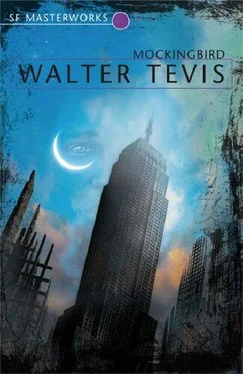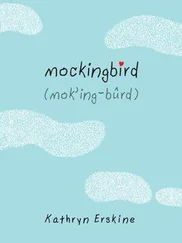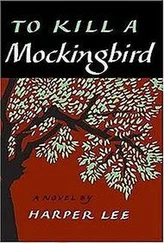“And then?” Spofforth said.
“I played the film over, more times than I could count. Slowly I began to realize, as though I had known it all along but hadn’t known that I knew it, that the teacher and the class were looking at the marks and saying words that were represented by the marks. The marks were like pictures. Pictures of words. A person could look at them and say the words aloud. Later I was to learn that you could look at the marks and hear the words silently. The same words and words like them were in the books I had found.”
“And you learned to understand other words?” Spofforth said. His voice was neutral, quiet.
“Yes. That took a long time. I had to realize that the words were made of letters . Letters made sounds that were always the same. I spent days and days at it. I did not want to stop. There was a pleasure in finding the things that the books could say within my mind…“ He looked down at the floor. ”I did not stop until I knew every word in the four books. It was only later, when I found three more books, that I discovered that what I was doing was called ‘reading.’“ He became silent and then, after a few moments, looked shyly up toward Spofforth’s face.
Spofforth stared at him for a long moment, and then nodded his head slightly. “I see,” he said. “Bentley, have you ever heard of silent films?”
“ Silent films?” Bentley said. “No.”
Spofforth smiled slightly. “I don’t think many people have heard of them. They’re very ancient. A great many were found recently, during a demolition.”
“Oh?” Bentley said politely, not understanding.
“The thing about silent films, Professor Bentley,” Spofforth said slowly, “is that the speeches of the actors in them are not spoken but written.” He smiled again, gently. “To be understood, they must be read.”
Spofforth suggested I do this. Talk into the recorder at nights, after work, and discuss what I had done during the day. He gave me extra BB’s just for this.
The work is dreary at times; but it may have its rewards. I have been at it five days now; this is the first on which I have felt at ease enough with the little recording machine to begin talking about myself into it. And what is there to say about myself? I am not an interesting person.
The films are brittle and must be handled with the greatest of care. When they break—as they frequently do—I must spend a careful time splicing them back together. I tried to get Dean SpoSorth to assign me a technician robot, perhaps a moron robot trained as a dentist or in some kind of precision work, but Spofforth merely said, “That would be too expensive.” And I’m certain he’s right. So I thread the films into strange old machines called “projectors” and make certain they are adjusted properly and then I begin projecting them on a little screen on my bed-and-desk. The projector is always noisy. But even my footsteps seem terribly loud down here in the basement of the old library. Nobody ever comes here, and moss grows on the ancient stainless-steel walls.
Then, when words appear in print on the screen I stop the projector and read them aloud into a recorder. Sometimes this only takes a moment, as with lines like “No!” or “The End,” where only the slightest hesitation is needed before pronouncing them. But at other times harder phrases and spellings occur, and then I must study for a long time before I am certain of the wording. One of my most difficult was on one of those black backgrounds on the screen after a highly emotional scene where a young woman had expressed worry. It read, in full: “If Dr. Carrothers does not arrive presently, Mother is certain to take leave of her senses.” You can imagine the trouble I had with that one! And another went: “Only the mockingbird sings at the edge of the woods,” spoken by an old man to a young girl.
The films themselves are at times fascinating. I have already gone through more of them than I know how to count and more than those remain. All of them are black and white, and they have the kind of jerky motions of the huge ape in Kong Returns . Everything about them is strange, not just the way the characters move and react. There is the—how can I say this?—the sense of involvement to them, the sense that great waves of feelingfulness wash over them. Yet to my understanding they are sometimes as blank and meaningless as the polished surface of a stone. Of course I do not know what a “mockingbird” is. Or what “Dr.” means. But it is more than that which disturbs me, more even than the strangeness, the sense of antiquity about the life that they convey. It is the hint of emotions that are wholly unknown to me—emotions that every member of the ancient audience of these films once felt, and that are now lost forever. It is sadness that I feel most often. Sadness. “Only the mockingbird sings at the edge of the woods.” Sadness.
Often I eat lunch at my bed-and-desk. A cup of lentil soup with monkey bacon. Or a soybar. The servo janitor has been programmed to feed me what I ask for from the school cafeteria. I will sit, sometimes, and play a film section over and over again, eating slowly, trying to feel my way into that dim past. Some things I see there I cannot forget. Sometimes it will be a scene of a small girl crying over a grave in a field. Or of a horse standing on a city street, with a cumpled hat on its head and the ears sticking through, or of old men drinking from large glass mugs and laughing in silence on the screen. Sometimes, watching these things, I find myself in tears.
And then for days at a time all the feeling goes and I merely drudge on, going through a whole two-reel film from beginning to end in a kind of mechanical way: “Biograph Pictures presents Margaret’s Lament . Directed by John W. Kiley. Starring Mary Pickford…“ And so on, until ”The End.“ Then I shut off my recorder and remove the little steel ball and place it in its compartment in the black air-sealed case that holds the film. And then on to the next.
That is the drudgery part, and I sustain myself with marijuana and naps when it gets to be more than I can bear.
I saw a group immolation today, for the first time in my life. Two young men and a woman had seated themselves in front of a building that made and dispensed shoes along Fifth Avenue. They had apparently poured some flammable liquid over themselves, because they looked wet. I saw them just as the woman applied a cigarette lighter to the hem of her denim skirt and pale flames began to engulf them like a yellow blossom of gauze. They must have been filled with all the right drugs, because there was no sign of pain on any of their faces—only a kind of smiling—as the flame, pale in the sunlight, began first to redden them, then to make them black. Several passersby stopped and watched. Gradually a bad smell began to fill the area, and I left.
I had heard of such immolations, always in groups of three, but I had never seen one before. They are said to happen frequently in New York.
I have found a book—a real book! Not one of the slim readers that I studied from in Ohio and that only told of Roberto and of Consuela and of their dog Biff, but a real, thick palpable book.
It was simple. I merely opened one of the hundreds of doors along the vast stainless-steel hallway outside my office and there, in the center of a small bare room, in a glass case, sat this large, fat book. I lifted the top of the case, which was thick with dust, and picked it up. It was heavy, and its pages were dry to the touch and yellow. The book is called Dictionary . It contains a forest of words.
Читать дальше











